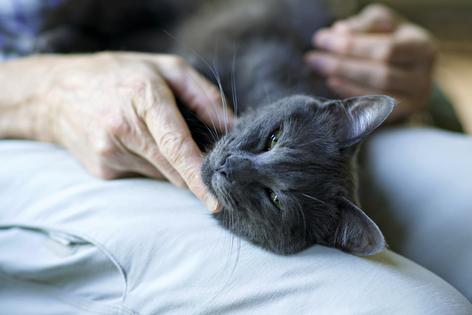My Pet World: Quarantine with pets required before transition to assisted-living facility
Dear Cathy,
My dad and stepmom have a 19-year-old cat, who sleeps and lives on a couch and goes to the litter box, three-feet away. This cat has been a very divisive and disruptive element in our family for than 15 years. (My stepmom believes it is her child that she lost through a miscarriage.)
They live several hours away. Dad is 89 and my stepmom is 84 with dementia. They need to move to an assisted-living facility near me. The facility accepts pets. However, COVID 19 requires some quarantine requirements before they can move into the facility. I want them to move her and stay with me to meet all the requirements, so they are in. But I own two dogs and a parrot, so the cat would not be a good fit in the house. Plus, my wife and daughter are allergic to cats.
I offered to make the cat comfortable in the garage. My dad said that was unacceptable. This cat has caused numerous problems in the past. Now it is putting my dad’s and stepmom’s health, safety and welfare in jeopardy and risk. Any suggestions?
-Bruce, Cooper City, Florida
Dear Bruce,
The cat is not causing any issues. It’s the assisted living facilities’ new rules related to COVID-19 that you’re having to work around.
Your parents have a strong emotional attachment to their 19-year-old cat. They love this cat and consider him/her a valued family member. So, naturally, the garage doesn’t sound like a great place for their beloved feline.
There are a few things you can offer to do.
Option 1: Offer to let the cat stay inside your home, but he/she must remain in the guest room, where your parents will be sleeping, the entire time. This arrangement allows the cat to sleep with your parents and allows your parents to spend time in the room with the cat whenever they want, which is not something they can do if the cat is in the garage. Use a baby gate leading up to the guest room to keep your dogs from getting too close to the room, and to allow one more layer of protection should the cat accidentally bolt into the hall. From the sound of his sedentary life, though, he seems like he will mostly just sleep when your parents aren’t in the room.
Option 2: Find a friend or another family member who can foster the cat for the quarantine period required. You also can try to call the local animal shelter to see if they have a foster family who might be willing to help in this instance.
Option 3: If the cat is up-to-date on his/her vaccinations, find a local kennel where the cat can reside during the quarantine period.
Please know your parents will only be happy with the first option. Placing the cat in foster care or a kennel would be hard on a 19-year-old cat, so look for a way to make the first option work. As long as the cat remains in the room the entire time and the dogs and cat don’t meet, all should be well. Keeping the cat isolated in their guest room also will prevent your wife and kid’s allergies from acting up.
Even under the best of circumstances, there would be some stress in the house as you oversee this transition for your parents. So, expect some stress to occur and remind yourself this is a temporary situation.
Dear Cathy,
My 10-year-old male cat, Morris, recently developed an issue where he will attempt to poop in his litterbox, but nothing comes out. He may do this several times a day. He is peeing fine. The veterinarian did an x-ray of his colon and there are no signs of blockage. The vet also checked for a urinary tract infection, also negative. The vet is stumped. Other than this odd behavior, he seems fine. Any suggestions?
-David, Allentown, Pennsylvania
Dear David,
I am not a veterinarian, but this mystery could be a symptom of several underlying health problems, so please visit your veterinarian again (or another veterinarian) to investigate this further.
In the meantime, dehydration and poor fiber can also cause these symptoms in cats, so my recommendation is to add more water to your cat’s diet by feeding him wet food instead of dry. And, talk to your veterinarian about the best way to add some fiber to his diet, which could involve a dietary change, or a fiber source added to his current diet.
========
(Cathy M. Rosenthal is a longtime animal advocate, author, columnist and pet expert who has more than 25 years in the animal welfare field. Send your pet questions, stories and tips to cathy@petpundit.com. Please include your name, city, and state. You can follow her @cathymrosenthal.)
(c) 2020 DISTRIBUTED BY TRIBUNE MEDIA SERVICES, INC.










